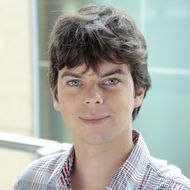HSE University Creates the Viral Genealogy Simulator to Model the Spread of COVID-19

Researchers of HSE Tikhonov Moscow Institute of Electronics and Mathematics (MIEM), in cooperation with their colleagues from the University of California, Santa Cruz (UCSC), and The European Bioinformatics Institute (EMBL-EBI), have developed software to model the spread of the COVID-19 global pandemic. This is the world’s fastest Viral Genealogy Simulator (VGsim). For more details about this scalable simulator, read the reprint on medRxiv. The code is freely available at GitHub.
Around 180 million coronavirus cases have been reported globally to date, and the number of SARS-CoV-2 genomes in the GISAID open database exceeds 2 million. Methods are being actively developed to analyze this data. Each method should be carefully verified in terms of its sensitivity to assumptions on population homogeneity, accidental effects that frequently occur in reality, etc. The Viral Genealogy Simulator is software designed to verify data analysis methods related to the genetic nature of the coronavirus.

Vladimir Shchur
‘Since we are unable to simulate the conditions of the pandemic in a lab, computer modelling appears to be the only way of such verification. Various scenarios are run multiple times to prove the reliability of a method and its sensitivity to approximations of mathematical models compared to the real world. It is all quite like in physics,’ says Vladimir Shchur, Head of the International Laboratory of Statistical and Computational Genomics, HSE University.
Genetic sequences of viruses can be used to track the course of their spread, building their genealogy and the tree of infections. These trees are a rich source of information, including about the evolution of pathogens. The simulator able to generate such gigantic trees helps researchers prove that their method works correctly.
The simulator is able to generate trees of dozens or even hundreds of millions of genome samples for the world’s population. ‘Neutral’ (evolutionally irrelevant) mutations can then be added to these trees by using other software developed by one of the authors. Thus, the two computer programs generate synthetic viral genomes, linking their genealogy and the pandemic dynamics.
The simulator relies on the SIR model, in which the population is divided into three groups: Susceptible, Infectious, and Recovered. This model was proposed over 100 years ago. The researchers have modified it to account for various types of immunity and the population structure—considering a number of regions or countries between which migration takes place.
The user can insert population-related data such as names of countries or regions. The frequency of contacts is set for each country, region or population. This frequency can be reflected by the population density or other cultural aspects, including, for instance, mask wearing culture as an additional contact barrier.
The researchers point out that the traditional SIR model does not take migration into account. Relevant modifications have been made in relation to the more contemporary models.
Having generated the dynamics of the infection spread, the researchers built a genealogical tree of samples. ‘This is a common approach in genomics—we watch the evolution not from the past to the present, but in the reverse flow of time. Based on the dynamics generated, we create a tree, building relationships between virtual samples which appeared in this virtual pandemic,’ Vladimir Shchur explains.
Genealogy of the hypothetical samples in the virtual laboratory helps understand where the strain originated and spread. Using the simulator, we can verify the accuracy of the currently available methods designed to generate such genealogical trees.
See also:
HSE Biologists Explain Mechanism behind Coronavirus Evolution
A team of researchers, including scientists of the HSE Faculty of Biology and Biotechnology, have analysed the evolutionary path of the coronavirus from the Wuhan variant to Omicron. Their findings indicate that many genomic mutations in SARS-CoV-2 are shaped by processes occurring in the intestines and lungs, where the virus acquires the ability to evade the inhibitory effects of microRNA molecules. The study findings have been published in the Journal of Medical Virology.
Russian Researchers Explain Origins of Dangerous Coronavirus Variants
HSE researchers, in collaboration with their colleagues from Skoltech and the Central Research Institute for Epidemiology, have uncovered the mechanisms behind the emergence of new and dangerous coronavirus variants, such as Alpha, Delta, Omicron, and others. They have discovered that the likelihood of a substitution occurring at a specific site of the SARS-CoV-2 genome is dependent on concordant substitutions occurring at other sites. This explains why new and more contagious variants of the virus can emerge unexpectedly and differ significantly from those that were previously circulating. The study’s findings have been published in eLife.
Pivot to the East: A Comprehensive Study of the Cultural and Civilisational Centres of the Non-Western World is the Top Priority
China and the Chinese world, South Asia, Southeast Asia, the Arab countries, Iran, Turkey, Central Asia and Africa are gaining new significance in Russia’s foreign policy. However, we do not know enough about the Eastern countries. It is necessary to change the priorities in education, starting from grammar school. Prospects for the development of domestic Oriental studies in the context of the new stage in the development of the system of international relations were discussed at a round table at HSE University.
‘I Admire HSE Students’ Eagerness to Learn, to Discuss, to Broaden Their Perspectives’
Robert Romanowski was a ‘Digital Professor’ at HSE University in November 2021. In his interview for the HSE News Service, he talked about the specifics of online teaching, his course on Strategic Branding, and the skills that are essential for marketing professionals today.
Russia and Africa: Time to Expand Cooperation
There is major potential for economic and humanitarian cooperation between Russia and African countries. Particularly, Russian organisations and universities can help transfer competencies and knowledge in the fields of agriculture, energy, industrial production, environmental management, climate change, and public administration. Experts and representatives of African embassies in Russia discussed these issues at the round table ‘Russia-Africa Sharing Knowledge’ hosted by HSE University.
The Brain in Space: Investigating the Effects of Long Spaceflights on Space Travellers
As part of an international project conducted with the participation of Roscosmos and the European Space Agency, a team of researchers used differential tractography to analyse dMRI scans ofcosmonauts’ brains and found significant changes in brain connectivity, with some of the changes persisting after seven months back on Earth. The paper is published in Frontiers in Neural Circuits.
HSE University-Perm and the Training Centre of the Uzbek Ministry of Finance Sign Cooperation Agreement
HSE University in Perm has become the first academic partner of the Training Centre under the Ministry of Finance of the Republic of Uzbekistan. The parties have signed a cooperation agreement in education and research.
HSE Biologists Prepare Strategy for Universal COVID Test
Russian researchers have developed a strategy to create a cheap and rapid COVID-19 test based on isothermal amplification. According to their publication in Applied Biochemistry and Microbiology, use of this strategy will make it possible to create universal test systems for any of the COVID-19 variants.
HSE University Strengthens Ties with Netherlands in Agricultural Research and Education
On November 9, 2021, HSE University signed a memorandum of understanding with Wageningen University & Research, a major university in the Netherlands and one of the leading agricultural research institutes in the world. Participants of the signing ceremony included HSE University Rector Nikita Anisimov, President of the Wageningen University & Research Executive Board Professor Louise Fresco, and Dutch Ambassador to Russia Gilles Beschoor Plug.
The Majority of Russians Do Not Support Microchip Implants
The majority of Russians would not agree to being fitted with microchip implants for any purposes—medical or otherwise. A joint study conducted by HSE University’s International Laboratory for Applied Network Research and Aventica found that respondents believe the risks of personal data leaks and misuse to be too high.


